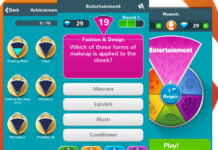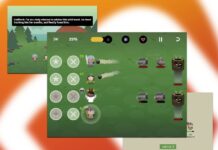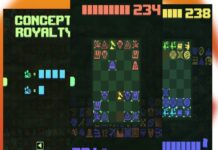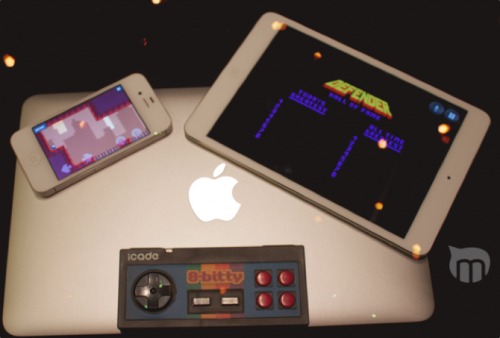
Mac gamers, you get a little more love this week. I’ve got two games for you—one of which is the newest action-RPG from the makers of Bastion. I’ve also got Disney’s free-to-play puzzle game for iPhone from earlier this year, as well as an iPhone tribute to an arcade classic.
Table of Contents
Technoccult: Covenant – Mac
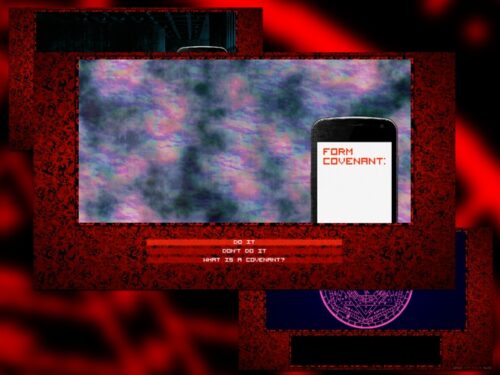
Technoccult: Covenant is not a game for everyone. A short half-hour text adventure is already a bit of a niche product; add in a story about a phone that tries to steal your soul, and you’ve got something with a very unique audience. The thing is, this aesthetic is awesome.
I’m not going to say much about the plot, as it’s a quick tale of terror. You simply read through the text, making choices as you go. There is a lot of craft to the game that pushes you through the narrative to the eventual end. If you explore the game, you’ll find that it isn’t as branching as your array choices would lead you to believe, and the game ends with a “To Be Continued.” Hopefully the continued installments come out soon, as this was a really cool concept I would like to see explored further.
What’s Good: Cool story, interesting design.
What Sucks: Short.
Buy it? If you like horror games and don’t mind text adventures, check out Technoccult: Covenant. Name your own price and download it here.
Transistor – Mac
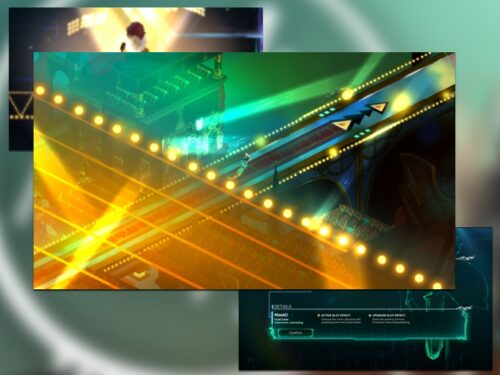
After I played through the first few hours of Transistor, I IM’d my friend at work: “Transistor, Oh my god, Transistor.” That enthusiasm isn’t unwarranted. If you played Bastion on the Mac or iPad, you’ll know why I was so excited when Transistor finally came out on the Mac.
If you judge too quickly, though, you’ll think this is just more of the same.
Gruff, voice over? Check.
Vague apocalyptic scenario? Check.
Isometric Perspective? Check.
However, if you’ve ever played Bastion, you’ll notice right away that Transistor borrows cues that that title and incorporates them entirely. Transistor combines cyberpunk, noir, and fantasy into something entirely unique. The landscapes consist of shadows and neon, and that includes the horizon. The game has terminals stashed everywhere that give you background on life before The Process began to destroy everything.
The Process is a virus that is part biological and technological: It comes in different forms, and only your sword is able to kill it.
Your sword can hold the personalities of the deceased, and each personality has their own attacks. You have four primary attacks, and then each attack has two possible support slots you can fill with various powers. You also have four passive slots you can unlock as well. Swapping the various powers throughout the different slots unlocks the story for each of the characters.
More importantly, it allows for a hugely custom approach to the game. You can play with the various layouts to find a set that matches your play style. This game also adds a turn-based system similar to VATS in the Fallout games. You can quickly stack a bunch of actions, but you aren’t able to do anything by run around until your action points replenish.
With interesting design and an engaging story, Transistor surpasses Bastion in a lot of ways. It’s hard not to compare the two games because they are so similar, but there’s nothing wrong with that. In fact, I may go back and take another run through Bastion.
What’s Good: Great design, excellent story, variety of combat options.
What Sucks: Took forever to come to the Mac.
Buy it? If you were a fan of Bastion, or are just looking for a strong action-RPG, pick up Transistor. It is $19.99 on the App Store. Check out the great soundtrack on iTunes.
Space Beats Saga – iPhone
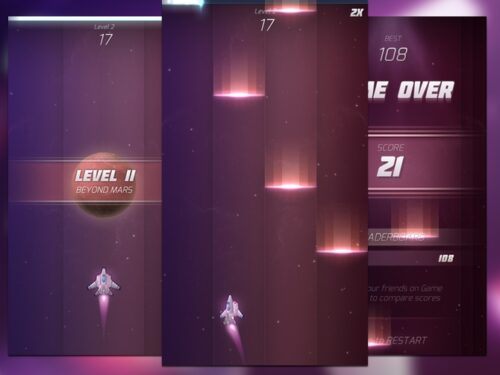
Flappy Bird created a phenomenon, leading a lot of people to assume that one finger controls are the future of gaming. The problem seems to be that most of these games are just riffs off of Flappy Bird. Space Beats Saga isn’t that, though it does share Flappy Bird’s difficulty curve.
You have a ship that you need to swerve around lanes to avoid waves of energy that come toward you as you fly. You can get power-ups that double your points as you go. The farther you go in the game, the more lanes you will need to navigate, which can get tricky in the latter stages.
Space Beats Saga will frustrate a lot of people, but other than the lack of a built-in tutorial, there isn’t much to complain about. It’s made well.
What’s Good: Neat take on the single finger game.
What Sucks: Difficulty curve, no automatic tutorial.
Buy it? If you’re looking for a quick little arcade game that might be a bit maddening, check out Space Beats Saga. Grab it on the App Store for free.
Tsum Tsum – iPhone
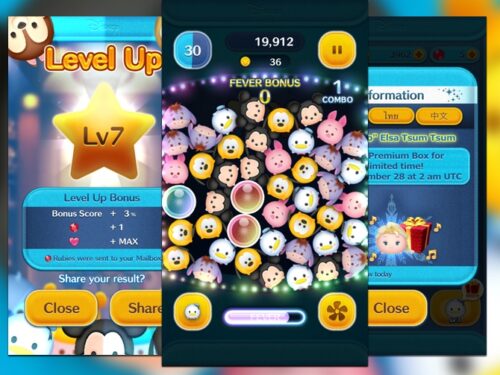
Tsum Tsum is a Disney attempt to create a puzzle addiction on the level of Candy Crush Saga. And its premise is simple: You get a pile of stuffed Tsums, which are basically football-shaped things with Disney characters’ faces on them, and you clear the pile by connecting lines of three or more like Tsums. The longer the line, the more you score. If you score enough points quickly enough, you’ll get Fever mode, which slows the clock and increases your score. You’ll also get orbs that you can tap to clear a bunch of Tsums all at once.
One of your Tsums gives you a bonus ability: You get Mickey to start, but can buy other bonus-bestowing Tsums via in-game currency. Most off this is standard iOS game fare; what is strange, though, is that Disney doesn’t let you sign in with your Facebook account. Instead, you can sign in with a LINE account. There doesn’t seem to be an easy way to sign up for an account with LINE, so I just play as guest. Most of Tsum Tsum’s LINE integration—and online content in general–is just slow and buggy. These drawbacks really mar what could be a fun and addictive game.
What’s Good: Fun concept, easy to pick up and play.
What Sucks: LINE integration and online content is slow and buggy.
Buy it? If you’re looking for a new puzzle game and have a lot of patience, check out Tsum Tsum. Pick it up on the App Store for free.
Grey Cubes – iPhone
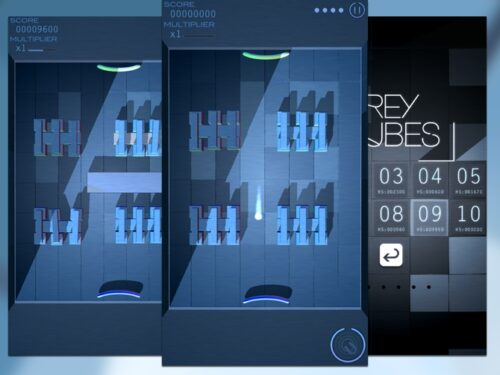
If you are going to try and remake a classic arcade game, you have to make some interesting choices. Sometimes this means bolting on modern concepts until it barely resembles the classic game. Other times, it means making the umpteenth clone that barley has any of the original DNA involved. But every now and then, you’ll find a game like Grey Cubes, which puts a great coat of paint onto Breakout. (And if somehow all you whippersnappers out there have no idea what Breakout is, here’s a link to Wikipedia.)
It works perfectly. You drag your finger left to right to control the paddle. You launch the ball with a double tap. As you keep the ball from falling, bricks will drop power-ups as they break. Grey Brick’s twist on the genre might be the magnet that powers up as you play. You can tap the magnet to make the ball attracted to the remaining bricks on screen, thus solving that annoying aspect of Breakout where you are stuck playing for a couple of minutes to hit one lonely brick. Later stages play with the game design, and include levels that require you to block both ends of the stage.
What’s Good: Nice design for a classic game, some gameplay improvements.
What Sucks: Purists may not like some of the changes.
Buy it? If you’re looking for a well-done update of an arcade classic, check out Grey Cubes. Grab it on the App Store for $1.99.



